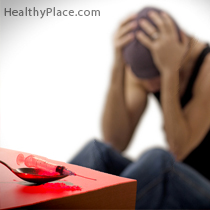How Depression Can Lead to Alcohol Abuse and Addiction
You have depression and you’re drinking or drugging to try and get rid of those feelings of sadness, hopelessness, numbness and isolation. Maybe you even have physical symptoms of depression that the alcohol or drugs seem to be relieving. In the end, however, you realize the drinking and drugs are making things worse.
While depression is a treatable mental health condition, many men and women are either getting improper depression treatment or no depression treatment at all. The combination of the overwhelming feelings associated with depression and improper recovery methods leads many people to turn to drugs or alcohol. The abuse of substances could occur because individuals are having a hard time coming to terms with the idea that they’re depressed or they may not recognize that the feelings they are experiencing are caused by depression. (Depression Co-occurring with Medical, Psychiatric and Substance Abuse Disorders)
The combination of the overwhelming feelings associated with depression and improper recovery methods leads many people to turn to drugs or alcohol. The abuse of substances could occur because individuals are having a hard time coming to terms with the idea that they’re depressed or they may not recognize that the feelings they are experiencing are caused by depression. (Depression Co-occurring with Medical, Psychiatric and Substance Abuse Disorders)
Through my counseling experience, I’ve met many people in group therapy who recognized that their substance abuse was related to attempts to self-medicate their symptoms of depression. Before seeking treatment, these men and woman would say they didn’t know why they were experiencing feelings of extreme sadness and hopelessness. All they knew is that they wanted to change how they felt and a bottle looked like the solution.
While, for some individuals, the drugs or alcohol changes how they felt in the short run, they realized that abusing substances only made things worse; the depression symptoms increased and now they had an addiction problem. Initially, they were able to block out some of their feelings, but that was short-lived. Once the effects of their preferred substance wore off, the feelings came rushing back creating a vicious cycle of depression and substance abuse, which, for many, ultimately lead to addiction. (What Causes Drug Addiction?)
Why Some People Don’t Seek Depression Treatment
So after facing days filled with complete sadness and feeling as if there was nothing in the world that could create happiness, the big question is why wouldn’t someone seek help for depression? (Why, When and How To Seek Treatment For Depression)
Back in my community center counseling days, I would have new clients that would make appointments to come in to talk about their depression, then never show up. They would reschedule a few times, but in the end would never call back and never came in for an appointment. Other clients would come in for an initial assessment and then the counseling center would never hear from them again. My supervisor said that those individuals must not be at the place where they were ready to face treatment for depression and that many people have fears about getting depression help.
There are a number of different reasons some individuals do not seek out professional help for their depression or substance abuse problems, even if they realize that they have a problem. They include:
- don’t want to take psychiatric medication and are worried the doctor will prescribe antidepressant medication
- feeling that the depression is only temporary and the bad feelings will go away on their own
- embarrassment and shame over struggling with depression and scared to open up to a counselor
- concern over being judged by others
- scared to open up about painful topics that have been buried for so long
Residential Treatment for Co-occurring Disorders
 Depression is a medical condition and is nothing to be ashamed of. A number of my clients began treatment in a residential setting. They found it very helpful with starting them on the path to sobriety and assisting in managing their depression at the same time. (Alcoholism Rehab: Time for an Alcohol Treatment Center?)
Depression is a medical condition and is nothing to be ashamed of. A number of my clients began treatment in a residential setting. They found it very helpful with starting them on the path to sobriety and assisting in managing their depression at the same time. (Alcoholism Rehab: Time for an Alcohol Treatment Center?)
Both depression and substance abuse need to be treated simultaneously if an individual wants the best chance of a full recovery. The first step of any recovery process is to find a rehab facility that you feel comfortable with and that has a co-occurring disorders program (aka dual diagnosis program). When you do decide on a treatment program, a comprehensive medical and psychological evaluation will be completed to help the treatment staff identity your level of addiction, the severity of your depression, and any other medical issues you may be facing. Additionally, all of the gathered information will help your treatment team decide upon a personalized treatment plan that will guide you down the path of recovery.
Some individuals come to inpatient drug rehab treatment physically dependent on drugs or alcohol and will need to begin the process in a detoxification program which is designed to safely and effectively remove all toxic substances in your body. Once that process is completed, the therapeutic process can begin. Residential treatment programs offer individual counseling along with support group sessions. A lot of my clients have said that group was their favorite part because they were able to connect with others who were facing similar issues. Finally, residential treatment programs usually have family therapy, different types of experiential programming, and a discharge process that will help you transfer to your next stage of recovery.
You can also find Lauren Hardy on Google+.
Treatment Program: Lauren Hardy writes on behalf of Timberline Knolls, a leading rehab facility that provides individualized treatment programs designed to help women with co-occurring disorders.
APA Reference
Hardy, L.
(2014, March 5). How Depression Can Lead to Alcohol Abuse and Addiction, HealthyPlace. Retrieved
on 2024, April 19 from https://www.healthyplace.com/blogs/mentalhealthtreatmentcircle/2014/03/how-depression-can-lead-to-alcohol-abuse-and-addiction
Author: Lauren Hardy, MA
I started having problems with depression as a young teen but I didn't know what it was. I started using drugs and alcohol to cope but again I didn't realize that was what I was doing. I finally got help at age 28 in 1983 for my drinking. After being sober for 3 months I went into a bad depression and was fortunate to have a friend in my recovery who knew depression and talked me into going to mental health for help. I been sober since and still dealing with depression but have the tools to help. Thanks for a good article.